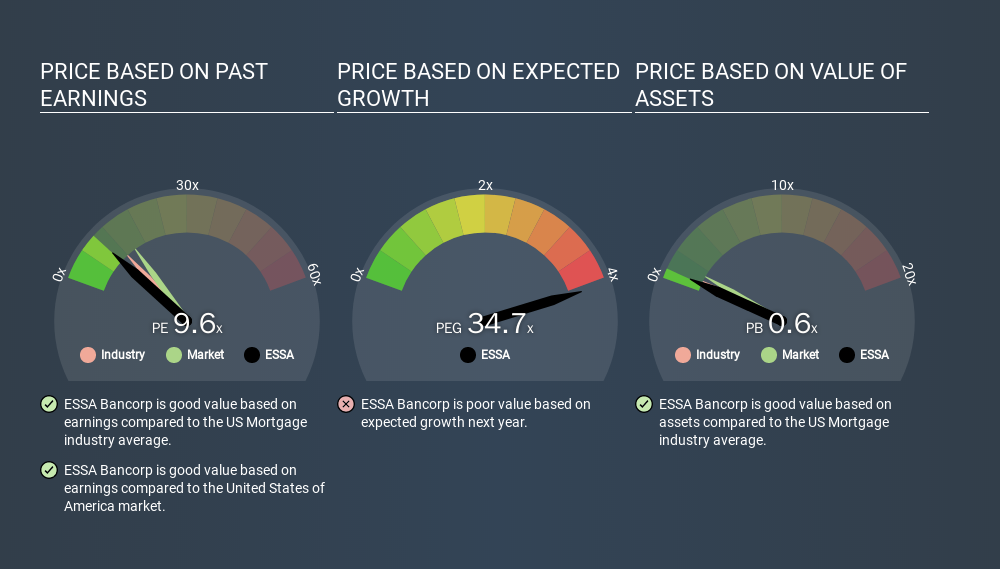- United States
- /
- Banks
- /
- NasdaqGS:ESSA
A Sliding Share Price Has Us Looking At ESSA Bancorp, Inc.'s (NASDAQ:ESSA) P/E Ratio

Unfortunately for some shareholders, the ESSA Bancorp (NASDAQ:ESSA) share price has dived 32% in the last thirty days. The recent drop has obliterated the annual return, with the share price now down 26% over that longer period.
All else being equal, a share price drop should make a stock more attractive to potential investors. In the long term, share prices tend to follow earnings per share, but in the short term prices bounce around in response to short term factors (which are not always obvious). So, on certain occasions, long term focussed investors try to take advantage of pessimistic expectations to buy shares at a better price. One way to gauge market expectations of a stock is to look at its Price to Earnings Ratio (PE Ratio). A high P/E ratio means that investors have a high expectation about future growth, while a low P/E ratio means they have low expectations about future growth.
Check out our latest analysis for ESSA Bancorp
Does ESSA Bancorp Have A Relatively High Or Low P/E For Its Industry?
We can tell from its P/E ratio of 9.62 that sentiment around ESSA Bancorp isn't particularly high. If you look at the image below, you can see ESSA Bancorp has a lower P/E than the average (10.9) in the mortgage industry classification.

This suggests that market participants think ESSA Bancorp will underperform other companies in its industry. While current expectations are low, the stock could be undervalued if the situation is better than the market assumes. It is arguably worth checking if insiders are buying shares, because that might imply they believe the stock is undervalued.
How Growth Rates Impact P/E Ratios
Generally speaking the rate of earnings growth has a profound impact on a company's P/E multiple. Earnings growth means that in the future the 'E' will be higher. That means even if the current P/E is high, it will reduce over time if the share price stays flat. And as that P/E ratio drops, the company will look cheap, unless its share price increases.
Most would be impressed by ESSA Bancorp earnings growth of 20% in the last year. And it has bolstered its earnings per share by 7.7% per year over the last five years. With that performance, you might expect an above average P/E ratio.
A Limitation: P/E Ratios Ignore Debt and Cash In The Bank
It's important to note that the P/E ratio considers the market capitalization, not the enterprise value. That means it doesn't take debt or cash into account. In theory, a company can lower its future P/E ratio by using cash or debt to invest in growth.
Such expenditure might be good or bad, in the long term, but the point here is that the balance sheet is not reflected by this ratio.
So What Does ESSA Bancorp's Balance Sheet Tell Us?
ESSA Bancorp has net debt worth a very significant 162% of its market capitalization. If you want to compare its P/E ratio to other companies, you must keep in mind that these debt levels would usually warrant a relatively low P/E.
The Bottom Line On ESSA Bancorp's P/E Ratio
ESSA Bancorp trades on a P/E ratio of 9.6, which is below the US market average of 13.3. The company has a meaningful amount of debt on the balance sheet, but that should not eclipse the solid earnings growth. If the company can continue to grow earnings, then the current P/E may be unjustifiably low. What can be absolutely certain is that the market has become more pessimistic about ESSA Bancorp over the last month, with the P/E ratio falling from 14.2 back then to 9.6 today. For those who prefer invest in growth, this stock apparently offers limited promise, but the deep value investors may find the pessimism around this stock enticing.
Investors have an opportunity when market expectations about a stock are wrong. If the reality for a company is not as bad as the P/E ratio indicates, then the share price should increase as the market realizes this. So this free visualization of the analyst consensus on future earnings could help you make the right decision about whether to buy, sell, or hold.
Of course, you might find a fantastic investment by looking at a few good candidates. So take a peek at this free list of companies with modest (or no) debt, trading on a P/E below 20.
If you spot an error that warrants correction, please contact the editor at editorial-team@simplywallst.com. This article by Simply Wall St is general in nature. It does not constitute a recommendation to buy or sell any stock, and does not take account of your objectives, or your financial situation. Simply Wall St has no position in the stocks mentioned.
We aim to bring you long-term focused research analysis driven by fundamental data. Note that our analysis may not factor in the latest price-sensitive company announcements or qualitative material. Thank you for reading.
About NasdaqGS:ESSA
ESSA Bancorp
Operates as a bank holding company for ESSA Bank & Trust that provides a range of financial services to individuals, families, and businesses in Pennsylvania.
Flawless balance sheet average dividend payer.
Similar Companies
Market Insights
Community Narratives


